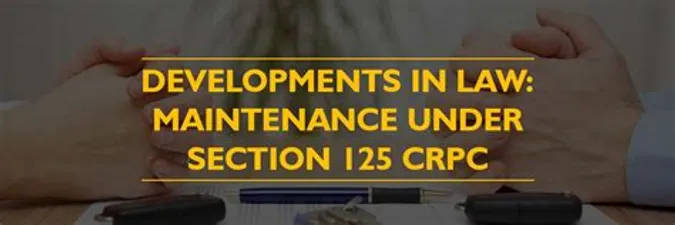In India, Right to maintenance traces its source in the personal laws as well as the common law, i.e. under Section 125 of the Criminal Procedural Code, 1973 (“CrPC”).
“This provision is a measure of social justice and specially enacted to protect women and children and falls within the constitutional sweep of Article 15(3) reinforced by Article 39. We have no doubt that sections of statutes calling for construction by Courts are not petrified print but vibrant words with social functions to fulfil. The brooding presence of the constitutional empathy for the weaker sections like women and children must inform interpretation if it has to have social relevance. So viewed, it is possible to be selective in picking out that interpretation out of two alternatives which advance the cause–the cause of the derelicts.”
– Justice V.K Iyer
Section 125 aims to discharge a social obligation in order to maintain societal balance. The Indian Courts have dealt with the aim and objective of Section 125 of the CrPC on various occasions and have held that this section is a measure of social justice. Some of the important judgments pronounced by the Supreme Court of India and the various High Courts dealing with Right to maintenance under Section 125 of the CrPC are concisely discussed below.
Chaturbhuj v. Sita bai (2008) 2 SCC 316
The Supreme Court held that the object of the maintenance proceedings is not to punish a person for his past neglect, but to prevent vagrancy by compelling those who can provide support to those who are unable to support themselves and who have a moral claim to support. The Court, relying on the judgment in the case of Captain Ramesh Chander Kaushal vs Mrs. Veena Kaushal, said that it is a measure of social justice and is specially enacted to protect women and children and falls within constitutional sweep of Article 15(3) reinforced by Article 39 of the Constitution of India. It is meant to achieve a social purpose. The object is to prevent vagrancy and destitution. The Court further held that under the law, the burden is placed in the first place upon the wife to show that the means of her husband are sufficient.
Savitaben Somabhai Bhatiya v. State Of Gujarat And Ors (2005) 3 SCC 636
The Supreme Court has held that the primary objective of maintenance is to provide the basic necessities of life to the wives, minor children or parents who are financially dependent on their husbands, fathers or sons respectively. It is the natural duty of a man to maintain his wife, children and parents, when they are not able to maintain themselves.
Bhagwan Dutt v. Kamla Devi (1975) 2 SCC 386
The Supreme Court held that the object of these provisions being to prevent vagrancy and destitution, the Magistrate has to find out as to what is required by the wife to maintain a standard of living which is neither luxurious nor penurious, but is modestly consistent with the status of the family. The needs and requirements of the wife for such moderate living can be fairly determined, only if her separate income, also, is taken into account together with the earnings of the husband and his commitments.
Rajnesh v. Neha (2021) 2 SCC 324
The Supreme Court dealt with majorly five issues pertaining to right to maintenance viz, issue of overlapping jurisdiction, payment of interim maintenance, criteria for determining quantum of maintenance, date from which maintenance would be awarded and enforcement of orders of maintenance. Considering the need for a uniform format of Affidavit of Disclosure of Assets and Liabilities to be filed in maintenance proceedings, the Court laid down several guidelines pertaining to the aforesaid issues and held that maintenance in all cases will be awarded from the date of filing the application for maintenance and for enforcement or execution of orders of maintenance, the Court directed that an order or decree of maintenance may be enforced under Section 28A of the Hindu Marriage Act, 1956; Section 20(6) of the Domestic Violence Act and Section 128 of CrPC, as may be applicable.
Bhuwan Mohan Singh v. Meena (2015) 6 SCC 353
The Supreme Court held that Section 125 of the CrPC was conceived to ameliorate the agony, anguish, financial suffering of a woman who left her matrimonial home for the reasons provided in the provision so that some suitable arrangements can be made by the Court and she can sustain herself and also her children if they are with her. The concept of sustenance does not necessarily mean to lead the life of an animal, feel like an unperson to be thrown away from grace and roam for her basic maintenance somewhere else. She is entitled in law to lead a life in the similar manner as she would have lived in the house of her husband. That is where the status and strata come into play, and that is where the obligations of the husband, in case of a wife, become a prominent one. In a proceeding of this nature, the husband cannot take subterfuges to deprive her of the benefit of living with dignity. Regard being had to the solemn pledge at the time of marriage and also in consonance with the statutory law that governs the field, it is the obligation of the husband to see that the wife does not become a destitute, a beggar. A situation is not to be maladroitly created whereunder she is compelled to resign to her fate and think of life “dust unto dust”. It is totally impermissible. In fact, it is the sacrosanct duty to render the financial support even if the husband is required to earn money with physical labour, if he is able bodied. There is no escape route unless there is an order from the Court that the wife is not entitled to get maintenance from the husband on any legally permissible grounds.
Shailja & Anr. v. Khobbanna (2018) 12 SCC 199
The Supreme Court held that merely because the wife is capable of earning, it is not a sufficient reason to reduce the maintenance awarded by the Family Court. The Court has to determine whether the income of the wife is sufficient to enable her to maintain herself, in accordance with the lifestyle of her husband in the matrimonial home. Sustenance does not mean, and cannot be allowed to mean mere survival.
Mohd. Ahmed Khan v. Shah Bano Begum (1985) 2 SCC 556
The Supreme Court held that Section 125 deals with cases in which, a person who is possessed of sufficient means neglects or refuses to maintain, amongst others, his wife who is unable to maintain herself. Since the Muslim Personal Law, which limits the husband’s liability to provide for the maintenance of the divorced wife to the period of iddat, does not contemplate or countenance the situation envisaged by Section 125, it would be wrong to hold that the Muslim husband, according to his personal law, is not under all obligation to provide maintenance, beyond the period of iddat, to his divorced wife who is unable to maintain herself. The argument of the appellant that, according to the Muslim Personal Law, his liability to provide for the maintenance of his divorced wife is limited to the period of iddat, despite the fact she is unable to maintain herself, has therefore to be rejected. The true position is that, if the divorced wife is able to maintain herself, the husband’s liability to provide maintenance for her ceases with the expiration of the period of iddat. If she is unable to maintain herself, she is entitled to take recourse to Section 125 of the Code. Therefore, there is no conflict between the provisions of Section 125 and those of the Muslim Personal Law on the question of the Muslim husband’s obligation to provide maintenance for a divorced wife who is unable to maintain herself.
Shabana Bano v. Imran Khan (2010) 1 SCC 666
The Supreme Court held that a divorced woman is entitled to claim maintenance from her ex-husband till the time she is not remarried.
Danial Latifi v. Union of India (2001) 7 SCC 740
The Supreme Court held that a comparison of Section 3(1)(a) and Section 3(3) of the Muslim Women (Protection of Rights on Divorce) Act, 1986 with Section 125 CrPC will will make it clear that requirements provided in Section 125 and the purpose, object and scope thereof being to prevent vagrancy by compelling those who can do so to support those who are unable to support themselves and who have a normal and legitimate claim to support is satisfied.
Sunita & Anr. v. Vijay Pal @Mohd. Sabir & Anr. (2022) SCC OnLine Del 2478
The High Court of Delhi held that a petition under Section 125 CrPC will be covered by the principle of res judicata due to its universal applicability, as proceedings under Section 125 CrPC are quasi-criminal in nature. Once the petition has been adjudicated under Section 125 CrPC favourably by a Court of competent jurisdiction on merits, a subsequent petition cannot be preferred which arises from the same dispute having similar situations, circumstances and grounds as the previously adjudicated issues in the earlier petition filed under Section 125 CrPC. The question regarding the recourse available to a person in case of changed circumstances and alteration sought after an order granting maintenance under Section 125 CrPC has been passed by a court of competent jurisdiction, lies answered under provisions of Section 127 CrPC and not Section 125 CrPC.
Ramchandra Laxman Kamble v. Shobha Ramchandra Kamble & Anr. 2018 SCC OnLine Bom 7039
The High Court of Bombay held that an agreement, by which the wife waived her right to claim maintenance, would be a void agreement as against public policy. Such an agreement would amount to ousting of jurisdiction of Magistrate and Family Court to entertain maintenance claim, which cannot be permitted by law. Therefore, the claim for maintenance cannot be rejected on the basis of such agreement of waiver of right to maintenance.
Birendra Kumar Tiwari v. Neetu Tiwari (2022) SCC OnLine Chh 2505
The Chhattisgarh High Court held that as per Section 125, CrPC, in order to get maintenance, daughter has to make out a case that she is unable to maintain herself or has not attained the age of majority.








